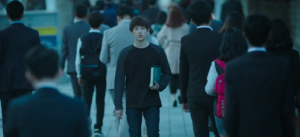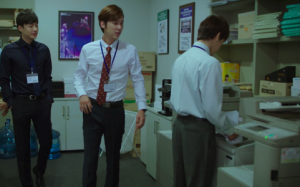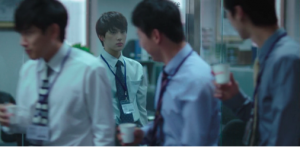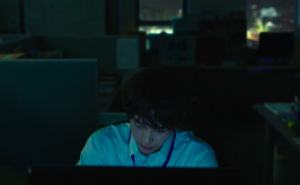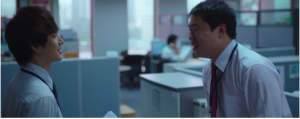Society always have its stereotypes. However, in the Western world, people are encouraged to not discriminate against people with different backgrounds. Although everyone has some sort of ideology of people with different backgrounds, people tend to avoid being open and direct about it. In the drama, Misaeng, discrimination can be blatantly seen as the main character, Jang Geu-rae, suffers at his workplace due to his educational status. This is a reflection of the current office environment in Eastern countries and especially in Korea. This essay will give a deep insight on Korean’s view in the importance of education and status.
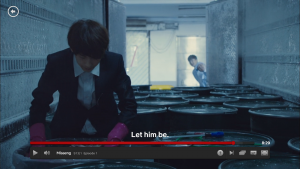
In the first episode, Jang Geu-rae is given an internship in one of the largest company in Korea. He got his position through some sort of relationship with the executives which is one of the reason that he is discriminated against. The biggest flaw that leads to him being excluded from his fellow interns is that he did not graduate high school nor received any post secondary education. In fact, he only has a General Equivalency Diploma, GED, which is considered to be the bare minimum for any person. In this episode, his colleagues played pranks on him as well as talked behind his back.
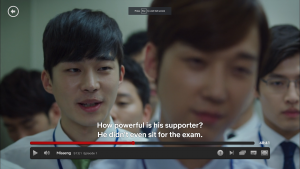
Korea as a society has the idea that success requires a good education. This thought is ingrained in them as they only considered people that graduate from top universities such as “Seoul National University, Korea University, and Yonsei University” a success (VanderGast et al. 2015, 4). Because of this philosophy, children in Korea live hellish lives during their education. In fact, due to importance of education, many students “reported high levels of stress in their daily lives” as well as “suicide [being] the leading cause of death among teens” (Hu, 2015). Since education is valued so deeply, the people that graduate from the top universities are given great status and will be respected. In the case of Jang Geu-rae, his lack of education is a valid reason for his coworkers to marginalize him even though he has not been given the opportunity to prove himself. Even when he is given a job that he succeeds in, such as the scene where he keeps his client’s company while his department chief, Mr. Oh, is stuck in traffic, he is still not recognized for his efforts. This prejudice against Jang Geu-rae is a representation of how important education and status is in the Korean society.
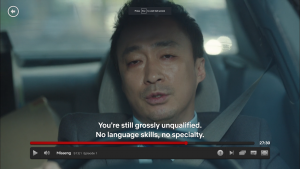
The reason why Korea values education and status so highly is a reflection of their history. “It is commonly accepted that the [Joseon] dynasty… permanently Confucianized Korean civilization, in effect rendering Korea’s premodern culture inseparable from Confucianism itself” (Kyung, 2010, 72-73). When Joseon first came into power, Jeong Do-jeon with King Taejo abolished the previous religion of Buddhism that was held by the Goryeo dynasty (Lee et al. 1997, 279). They implanted Confucianism as the new religion which completely changed the structure of politics. This new structure requires scholars to take a standardized exam in order to become officials (T’aejo sillok, 273). This exam is similar to how students in today’s Korea take an exam to see what universities they can get into. When they are able to go to a prestigious university, it is similar to becoming an official in the Joseon era. Hence, it is shown that “educational status and hierarchy [is a] part of the Confucian philosophy” in which Koreans have incorporated in their subconscious minds due to their history (VanderGast et al. 2015, 4).
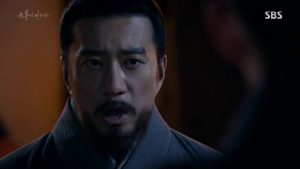
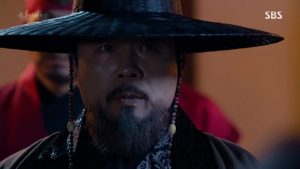
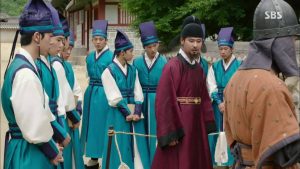
In conclusion, the discrimination Jang Geu-rae faced in Misaeng can be attributed to the lack of education and status he has. This discrimination is a reflection of the Korean society in that Koreans take status and education to high regards. The reason they value these qualities is because of the Confucius history they have. With the rise of Joseon dynasty, Confucianism became the dominant philosophy which leads to valuing education much more than before. This ideology carried over to the current society. In a way, today’s society is a reflection of the history that Korea has faced.
Question:
What are some other reasons that Koreans value education and status so deeply?
As the current society is slowly deviating from the discrimination due to the increase in multiculturalism in Korea, do you think that Koreans will change their ideology regarding education and status? Why or why not?
Bibliography:
Hu, Elise. “The All-Work, No-Play Culture of South Korean Education.” Parallels. April 15, 2015. https://www.npr.org/sections/parallels/2015/04/15/393939759/the-all-work-no-play-culture-of-south-korean-education.
Kim, Won-seok, dir. Misaeng. Number 3 Pictures, 2014. https://www.netflix.com/watch/80165296?tctx=0%2C0%2C2ccd12e1-70d7-46d9-8aae-7ac139b241fa-124328052%2C%2C.
Kyung, Moon Hwang. A History of Korea. New York: Palgrave Macmillan, 2010.
Lee, Peter H., WM. Theodore de Bary, Yongho Ch’oe, and Hugh H. W. Kang. Sources of Korean Tradition Volume One: From Early Times Through The Sixteenth Century. New York: Columbia University Press, 1997.
Shin, Kyung-soo, dir. Six Flying Dragons. Redwoods, 2015. https://www1.ondramanice.io/drama/six-flying-dragons-detail.
T’aejo sillok. “King T’aejo: Founding Edict 1:43a-45a.” Edited by Lee, Peter H. and WM. Theodore De Bary. Sources of Korean Tradition Volume One: From Early Times Through The Sixteenth Century. New York: Columbia University Press, 1997. 272-274.
VanderGast, Tim S, Sejal Parikh Foxx and Claudia Flowers, Andrew Thomas Rouse, Karen M. Decker. “A Window Into South Korean Culture: Stress and Coping in Female High School Students.” Journal of School Counseling 13, no. 13 (2015): 1-29.
